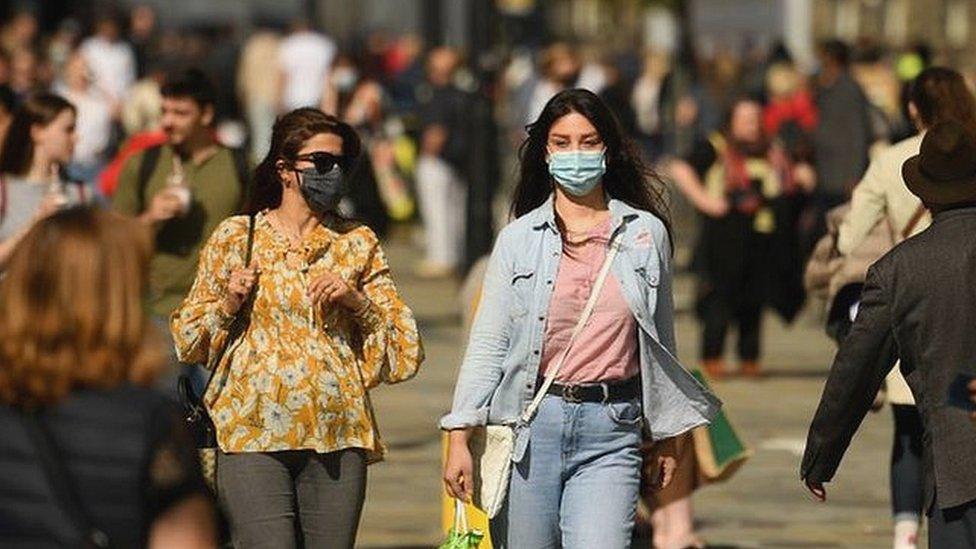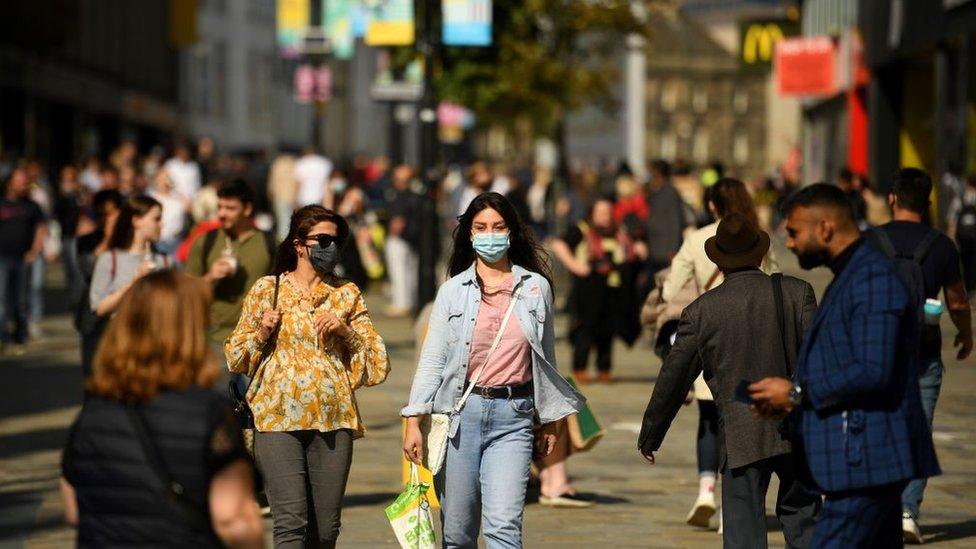North East councils call for Covid Plan B clarity
- Published

Plan B would involve mandatory mask wearing in public places
North East health chiefs have called upon the government to clarify when it will activate its Covid Plan B measures amid concerns over rates of infection.
The group of seven councils has written to Chief Medical Officer Chris Whitty highlighting that the region's rates are higher than the national average.
It said bringing in some restrictions would help ease pressure on the NHS.
The government has said it had no immediate plans to trigger Plan B but was closely monitoring the data.
The restrictions listed under Plan B are:
Communicating clearly and urgently to the public that the level of risk has increased, and the need to behave more cautiously
Introducing mandatory Covid passports
Making face coverings compulsory again
Recommending people work from home
The LA7 group of councils was set up last year to co-ordinate respond to the pandemic, and consists of County Durham, Gateshead, Newcastle, Northumberland, Sunderland and North and South Tyneside.
Their letter to Mr Whitty pointed out that the current seven-day case rate across the North East is 483.9 cases per 100,000 people - with North Tyneside the highest area at 747 and Durham the lowest at 417 - was higher than the national average.
LA7 also highlighted concerns over the infection rates in children aged 11 to 16, among the over 60s and the increase in the percentage of Covid patients occupying beds.
The letter also raised the issue of "high occupancy of non-Covid patients in our hospitals", which it points out has left fewer unoccupied beds than in the previous Covid waves in January and July.
It warned: "This is significantly limiting on our local system's ability to tackle waiting lists which in turn is pushing pressure out into social and primary care."
There was also an increase in outbreaks at care homes: up from 21 between 16-22 September to 37 between 21-27 October.
It claimed the figures suggested a "potential waning immunity... with our most vulnerable group".
'Minimise disruption'
There were also concerns from NHS colleagues about "increasing and sustained pressure across the system".
The letter added: "[We wanted] to seek clarity in relation to the trigger for additional measures - how and when government might decide to move to Plan B.
"We feel a move to at least aspects of [it] would help take pressure off the NHS and social care, allow time for the booster and flu vaccinations to roll out, and minimise disruption to schools and businesses from both illness and the measures."
It concluded: "It would help with local response, coordination, and communication with our communities if we understood more clearly the potential triggers viewed by government to implement further measures, and how they relate to broader pressures in the system rather than covid-19 case rates and deaths in isolation."
In response to previous calls to move to Plan B in recent weeks, the government said data did not suggest an immediate move to increased restrictions, but it was keeping an eye on [the data] and plans were ready to be put in place if needed.

Follow BBC North East & Cumbria on Twitter, external, Facebook, external and Instagram, external. Send your story ideas to northeastandcumbria@bbc.co.uk, external.
- Published1 July 2022

- Published28 July 2021
